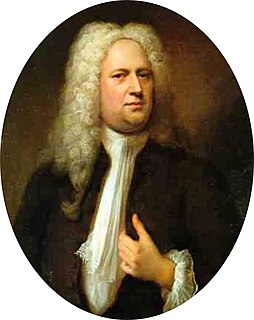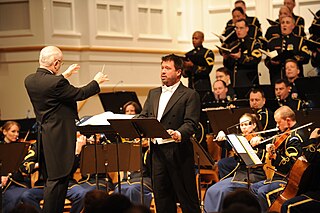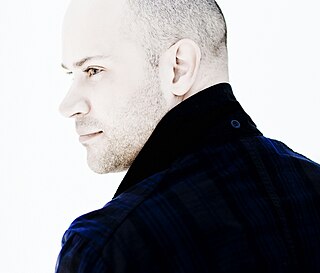Related Research Articles

The Barber of Seville, or The Useless Precaution is an opera buffa in two acts composed by Gioachino Rossini with an Italian libretto by Cesare Sterbini. The libretto was based on Pierre Beaumarchais's French comedy The Barber of Seville (1775). The première of Rossini's opera took place on 20 February 1816 at the Teatro Argentina, Rome, with designs by Angelo Toselli.
A countertenor (also contra tenor) is a type of classical male singing voice whose vocal range is equivalent to that of the female contralto or mezzo-soprano voice types, generally extending from around G3 to D5 or E5, although a sopranist (a specific kind of countertenor) may match the soprano's range of around C4 to C6. Countertenors often are baritones or tenors at core, but only on rare occasions do they use their lower vocal range, instead preferring their falsetto or high head voice.
A contralto is a type of classical female singing voice whose vocal range is the lowest female voice type.
A mezzo-soprano or mezzo (; Italian: [ˌmɛddzosoˈpraːno]; meaning "half soprano") is a type of classical female singing voice whose vocal range lies between the soprano and the contralto voice types. The mezzo-soprano's vocal range usually extends from the A below middle C to the A two octaves above (i.e. A3–A5 in scientific pitch notation, where middle C = C4; 220–880 Hz). In the lower and upper extremes, some mezzo-sopranos may extend down to the F below middle C (F3, 175 Hz) and as high as "high C" (C6, 1047 Hz). The mezzo-soprano voice type is generally divided into the coloratura, lyric, and dramatic mezzo-soprano.

Giulio Cesare in Egitto, commonly known as Giulio Cesare, is a dramma per musica in three acts composed by George Frideric Handel for the Royal Academy of Music in 1724. The libretto was written by Nicola Francesco Haym who used an earlier libretto by Giacomo Francesco Bussani, which had been set to music by Antonio Sartorio (1676). The opera was a success at its first performances, was frequently revived by Handel in his subsequent opera seasons and is now one of the most often performed Baroque operas.

Heavenly Handel: Arias and Duets is the title of a music recording Virgin Classics released on two compact discs in early 2004. It is a performance of arias and duets from operas by Georg Friedrich Händel.

David Daniels is an American countertenor.
Brian Asawa was a Japanese American opera singer who sang as a countertenor. About Asawa, Opera News stated: "In his prime, Asawa was an electric performer, his fearless performing style supported by a voice of arresting beauty and expressivity."
"In questa reggia" is an aria from Giacomo Puccini's opera Turandot set to a libretto in Italian by Giuseppe Adami and Renato Simoni. The text is based on Friedrich Schiller's adaptation of the play Turandot by Carlo Gozzi. The aria takes place in scene two of the second act, and is sung mostly by the Princess Turandot (soprano), but with a reply from Calaf (tenor), which is a key point of the opera.

Lucio Silla, K. 135, is an Italian opera seria in three acts composed by Wolfgang Amadeus Mozart at the age of 16. The libretto was written by Giovanni de Gamerra, revised by Pietro Metastasio.
"Largo al factotum" is an aria from The Barber of Seville by Gioachino Rossini, sung at the first entrance of the title character, Figaro. The repeated "Figaro"s before the final patter section are an icon in popular culture of operatic singing. The term "factotum" refers to a general servant and comes from Latin where it literally means "do everything".
"Il dolce suono" is the incipit of the recitativo of a scena ed aria taken from Act III scene 2, Lucia di Lammermoor by Gaetano Donizetti. It is also commonly known as the "mad scene" sung by the leading soprano, Lucia.

Bejun Mehta is an American countertenor. He has been awarded the Echo Klassik, the Gramophone Award, Le Diamant d’Opera Magazine, the Choc de Classica, the Traetta Prize, and been nominated for the Grammy Award, the Laurence Olivier Award, and the Preis der Deutschen Schallplattenkritik. Writing in the Süddeutsche Zeitung, Michael Stallknecht called him "arguably the best counter tenor in the world today."

"Mon cœur s'ouvre à ta voix" is a popular mezzo-soprano aria from Camille Saint-Saëns's opera Samson and Delilah, known in English as "Softly awakes my heart", or more literally "My heart opens itself to your voice". It is sung by Delilah in act 2 as she attempts to seduce Samson into revealing the secret of his strength.
"Torna ai felici dì" is a tenor aria from act 2 of the 1884 opera, Le Villi by Giacomo Puccini. It is sung by Roberto as he mourns the loss of the days of his youth and his beloved Anna. Anna has been killed by fairies that were conjured by a witch that seduced Roberto when he was away in Mainz. However, he does not find this out until after it happens.
"Popoli di Tessaglia! – Io non chiedo, eterni Dei" (K. 316/300b) is a recitative and aria for soprano and orchestra that Wolfgang Amadeus Mozart wrote for Aloysia Weber. It is famous for including two occurrences of a G6, i.e. the G above high C, or 1568 Hz by modern concert pitch – according to the Guinness Book of Records, the highest musical note ever scored for the human voice. (However, an A6 is scored in Ignaz Umlauf's Das Irrlicht, also sung by Aloysia Weber.)
"Bella figlia dell'amore" is a vocal quartet from act 3 of Giuseppe Verdi's 1851 opera Rigoletto.

"Va tacito e nascosto" is an aria written for alto castrato voice in act 1 of George Frideric Handel's opera Giulio Cesare in Egitto, composed in 1724 to a libretto by Nicola Francesco Haym. Sung by the character Julius Caesar, it features extensive solos for natural horn.
Kacper Filip Szelążek – Polish singer, countertenor.
"Ah, lo previdi!” – “Ah, t’invola” – “Deh, non varcar", K. 272, is a concert aria by Wolfgang Amadeus Mozart for solo soprano and orchestra. One of Mozart's first large scale operatic concert pieces.
References
- ↑ "Svegliatevi nel core". Aria database site. Retrieved 25 July 2018